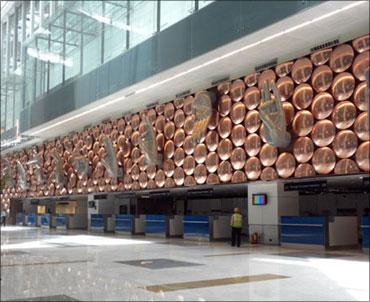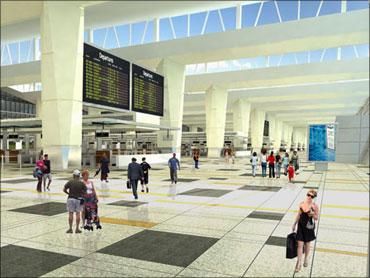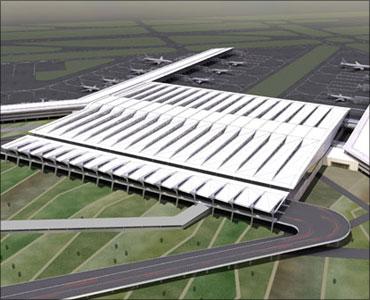 | « Back to article | Print this article |
Great airports, yes, but India needs more than that
Later this week, New Delhi will have a new airport. Its scale and size have been designed to shock and awe. Passengers will without doubt walk through its impressive interiors, experiencing the comforts of a world-class airport. But an airport is not just about how it looks, it is also about how it feels.
That feeling is shaped as much by physical comfort as it is by human interaction. People make the difference. That is the key to success in the services business.
India prides itself as a 'services economy' merely because more than half of India's gross domestic product (GDP) comes from the services sector.
The rapid and sustained growth of the sector over the past two decades, and of services exports have placed India's services sector in the global spotlight. If China is the 'workshop of the world', we have heard many business pundits say, India is the services sector of the world. Is that assured?
After having made its mark as a manufacturing power, China is focussed on its services sector. Speaking last week in Taipei, Stephen Roach, chairman of Morgan Stanley Asia and author of the book The Next Asia, predicted, "The China of tomorrow is not going to be the China of today. It's going to be a consumer-led China, a services-led China."
Click NEXT to read on. . .
Great airports, yes, but India needs more than that
It is a thought that jumps to one's mind as one encounters China's services sector -- be it in a market, a hotel, a bank or an airport; be it as a tourist or a business person. Nowhere does the human factor in services come out more sharply than in an airport where both the private sector and the public work side by side.
After the pleasant encounter with a charming clerk at the check-in counter comes the brusque interface with immigration and security. The speed and efficiency of check-in and baggage-handling are often in sharp contrast to the painful slowness of security.
The generation and social gap between the two categories of service providers is visible and explains to some extent the gap in quality of work. That is why passengers at Beijing airport are invited to rate the officials!
I have mentioned before in my columns the sharp contrast between the immigration/emigration and security counters at the New Delhi and Beijing airports. For a so-called 'bureaucratic state', China makes sure its lower level bureaucracy is people-friendly.
Click NEXT to read on. . .
Great airports, yes, but India needs more than that
The services sector accounts for just about 40 per cent of China's GDP but it remains a small part of China's external trade. Compared to the over 60 per cent share of merchandise exports in China's GDP, services sector exports accounted for just about 7 per cent till recently.
However, with the rapid rise of travel and tourism, transport and logistics, banking and financial services, and the phenomenal growth of power and telecommunications, the share of services in national income and trade is expected to rise sharply in China. Analysts expect China's educational and health sectors to also grow rapidly on both counts.
In 2002, China became the world's largest market for telecommunications; by 2020, it is expected to become the world's biggest market for tourism and related services. In line with this growth in income and expansion of capacity, China is also investing in the quality of its manpower in the services sector.
In a recent column, Barry Eichengreen made the telling point that while Japan caught up with the United States in manufacturing, it had failed to do so in services because of its failure to invest in the productivity of services sector workforce.
Click NEXT to read on. . .
Great airports, yes, but India needs more than that
People are to the services sector what machines are to manufacturing. Investment in research and development and new technology aimed at increasing the productivity of people working in the services sector is vital to the sector's growth.
But an increase in human productivity comes not just from access to better technology but from creation of a 'better' workforce. People matter. This is where India can still score over China if business leaders and managers understand the importance of investing in people. The quality of human power is vital to success and growth of the services sector. It defines the competitive process.
Consider the airlines business. Private airlines overtook Indian Airlines very easily on the back of better quality service more than anything else. The game has now shifted to competition among private airlines and this is a different ball game, as each of the players has come to recognise. Taking on Indian Airlines was easy for Jet Airways, not so facing the competition from Indigo!
The story is no different in telecom where private players easily competed against public sector players but are sweating it out in competition with equals.
Click NEXT to read on. . .
Great airports, yes, but India needs more than that
In both cases, airlines and telecom, the quality of employees who interact with customers is emerging as a major factor determining consumer preference. It is not just the giveaways that make a difference, but the takeaways too.
For India's services sector to maintain its lead and remain globally competitive, it will have to invest in new technologies and in the quality and productivity of its manpower. Skill development is a challenge both in manufacturing and services sectors in India.
The methodologies for quality improvement used in manufacturing, like Six Sigma, are increasingly being applied to the services sector too, and Indian services sector businesses must invest in them.
A new generation of Indians with new attitudes to work has been entering the services sector in a big way, with India having more white collar services sector employees than blue collar workers. They need better training and better management to become more productive and compete with potential rivals from across the world.





